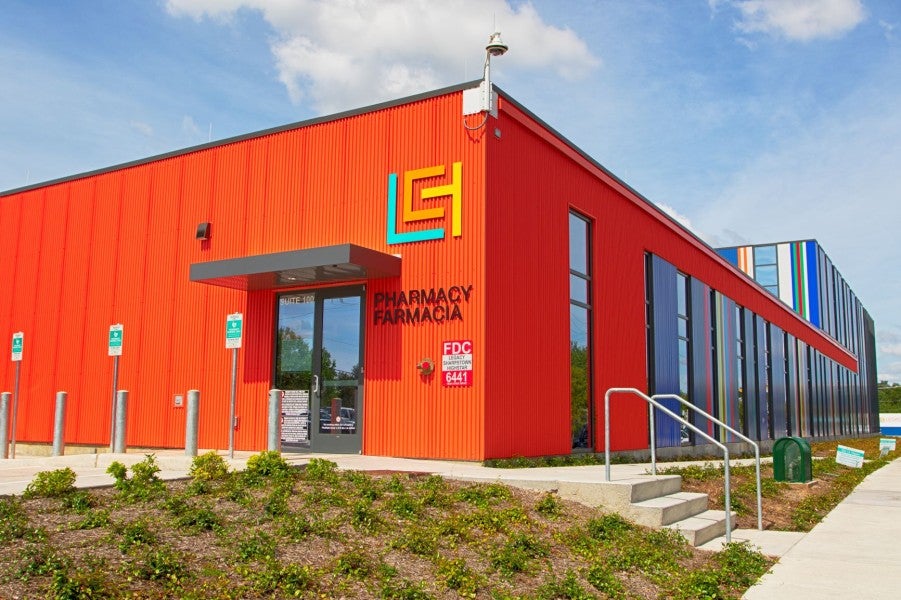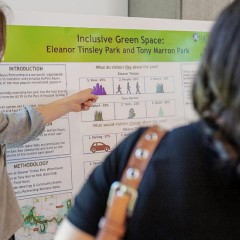For the 2023-24 academic year, 27 fellows were charged with researching and proposing solutions for nonprofit entities throughout the region. In exchange for their efforts, the Rice University undergraduates earned up to five upper-level credit hours of sociology electives in their chosen degree plan.
The experiential service learning program allows fellows to study theories of urban sociology in the classroom and undertake internships with local nonprofits. In creating their projects, fellows are paired with more than 20 partner organizations to research ways to address poverty and inequality.
Fellow Annelie Han (class of 2026) recently completed the Community Bridges program and reflected on her project.
What drew you to the program?
My interest in social justice and inequality began with being involved in diversity initiatives and organizations in high school, but it was during my first year at Rice that I discovered sociology as a means to systematically study social inequality. Fascinated by the cyclical and systematic nature of inequality illuminated by the work of past and present sociologists, I realized research could be a powerful tool to not only elucidate mechanisms of inequality but also inform policies for positive change.
Which organization did you focus on?
When it came time to meet each of the nonprofit partners during the first semester of the program, I was drawn to Legacy Community Health, a full-service Federally Qualified Health Center that provides comprehensive health care services across the Texas Gulf Coast region. As a psychology major aiming to work in mental health, I was interested in the intersection between mental health and social determinants of health, like food, transportation, utilities and housing. With Legacy's predominantly low-income, racial minority patient population whom often faces multiple social determinants of health, I wanted to see how I could support Legacy’s work in addressing gaps in mental health-related services.
What was the focus of your research?
During brainstorm meetings, my mentor, William Lyons, who serves as senior manager of programs in social determinants of health at Legacy, mentioned the recent expansion of post-pregnancy Medicaid coverage to 12 months in Texas. Through some preliminary research, I found that while 1 in 5 mothers are impacted by mental health conditions (e.g., “baby blues” (a form of postpartum depression), anxiety, obsessive-compulsive disorder, depression), 75% are untreated. Moreover, mothers of color and those who are low-income are more likely to experience mental health conditions but are also less likely to be able to access care. This disparity, I found, may be partly due to the lack of standardized procedures of care for addressing maternal mental health needs, which have only recently begun to be implemented across the health care industry.
I decided to focus my research project on maternal mental health care. As Legacy serves a large number of perinatal patients through its OB-GYN service line and already has a thriving behavioral health department, it is especially well-positioned to address gaps in maternal mental health care, especially among patients who typically experience more barriers to health care access.
How did you approach your research?
The primary objective of my study was to understand the current status of maternal mental health care at Legacy, including how conditions are screened for and treated. Specifically, I aimed to identify 1) what Legacy is doing well, 2) what are some current barriers to care or gaps and 3) suggestions for ways to optimize care.
To answer these questions, I conducted informational interviews with personnel and leadership at Legacy who provide care for perinatal patients in some capacity, such as in the areas of social work, transitions of care and OB-GYN. I also surveyed OB-GYN physicians on their perceptions of maternal mental health care at Legacy and their confidence in identifying and addressing their perinatal patients’ mental health needs.
What were your conclusions?
I found that Legacy has a well-established system for screening perinatal patients for mental health concerns and providing social services to address social determinants of health. However, some barriers and gaps in care include limited time during perinatal appointments to address mental health, lack of or loss of insurance coverage postpartum, and the urgency of basic needs often taking precedent over mental health. Some of the suggestions included creating a clear workflow for how to promptly get patients the appropriate care they need once they screen positive, investing in patient education resources to normalize maternal mental health and counter stigma, and offering maternal mental health-specific training for OB-GYN providers.
I hope that these findings offer valuable insights for Legacy's leadership to enhance maternal mental health care by building on strengths and addressing gaps, ultimately contributing to Legacy’s mission to provide quality, accessible health care to underserved communities.
In addition to the research study, I served as a Health Advocate Student Intern at Legacy’s Fifth Ward clinic, screening patients for social determinants of health and connecting them with community-based services (e.g., transportation to medical appointments, and free-of-cost food markets). Hearing patients’ stories was incredibly meaningful and gave me a deeper understanding of urban inequality.
What do you think of the Community Bridges program?
I’m immensely grateful for the invaluable experience and knowledge that the Community Bridges program provided me, which would not have been possible without the endless support of program directors Naomi Foamkom and Rogbe Stokes and professor Alex Priest. As a fellow, I had the incredible opportunity to apply classroom knowledge about urban inequality to conduct a research study in collaboration with a local nonprofit to address a real-world issue aligned with my academic and career interests. Community Bridges allows students to develop sociological knowledge and apply it in the community, truly enabling us to “go beyond the hedges.”


